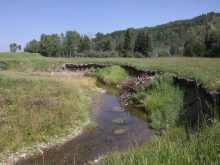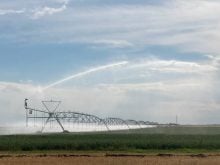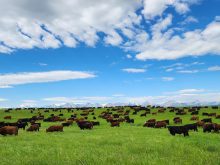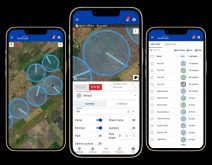Canada should be exploiting its enormous water resources to be both a sustainable food powerhouse and a global water research superpower, says a new paper from the Canadian Agri-Food Policy Institute.
Yet the country’s water policies, management and research efforts are underdeveloped and unco-ordinated, leaving water resources and challenges largely unaddressed.
That’s something that a national plan should fix, says the report written by Tyler McCann, Angele Poirier and Nicolas Mesly.
Read Also

Quebec pork company calls for transparency around gene-edited pigs
Quebec-based pork company duBreton is calling for transparency around meats from gene-edited pigs on concerns that a lack of mandatory labelling will confuse consumers, and dilute certification claims. The organic sector is also calling for labelling rules.
“Water security underpins food security and national security and should be considered a strategic asset. Without adequate availability and quality of water, food production and export are impossible,” says the report, called A National Agri-Food Water Action Plan and released Oct. 23.
“The greatest impact will be achieved when governments work together.”
The need for a national water policy comes from the fact that there really isn’t one, despite numerous attempts to link water management approaches over the decades.
“Canada has a fragmented and siloed model for water management.”
The strategy calls for federal, provincial and territorial agriculture ministers to work together to develop a pan-Canadian policy that will end today’s fractured situation.
“Multiple stakeholders raised the non-uniformity in data collection, the need for more research, and expressed frustrations with duplication and fragmentation of funding for water-related initiatives,” says the report.
The authors believe that the recently created Canada Water Agency can be used to bring together Canada’s various jurisdictions to develop a co-ordinated approach. Water management should be based upon a watershed approach.
A key concern is that few seem to be aware of the lack of care for the water and land that make Canada one of only seven countries on the planet that are substantial net exporters of food.
“The country … doesn’t think enough about protecting its water in terms of food management and production.”
Large amounts of agricultural land are being paved over as urbanization grows, while water resources are compromised. In the United States, aquifers and other water sources are being compromised, drained and potentially lost permanently. That is an example that could be avoided with a proper national policy and strategy, the authors think.
Water is a unique and perplexing commodity. It is often unpriced, tending to devalue it in many people’s minds. Yet it is the most crucial substance for food production and human life.
There is no shared sense of how to treat water on the most fundamental level.
“There is a whole debate about whether water is a right, a commodity or an essential or even sacred resource for the protection of life and biodiversity.”
The lack of clarity leaves farmers without a focus on developing Canada’s exceedingly rare opportunity.
“For Canadian agriculture and food there is a tremendous opportunity to turn that challenge into an opportunity.”
The paper supports calls for rewarding farmers for the water protection work they perform with sustainable practices.
“The environmental services provided by farmers, including protecting water quality, should be quantified and remunerated.”
The report said availability of water can take agriculture and food much further than it has developed so far.
“Water can be a strategic advantage for increasing food processing, providing competitive hydroelectricity rates, access to quality and quantity not available in other regions and an asset in their conservation and recycling programs.”
The report calls for long-term research and development.
Contact ed.white@producer.com


















